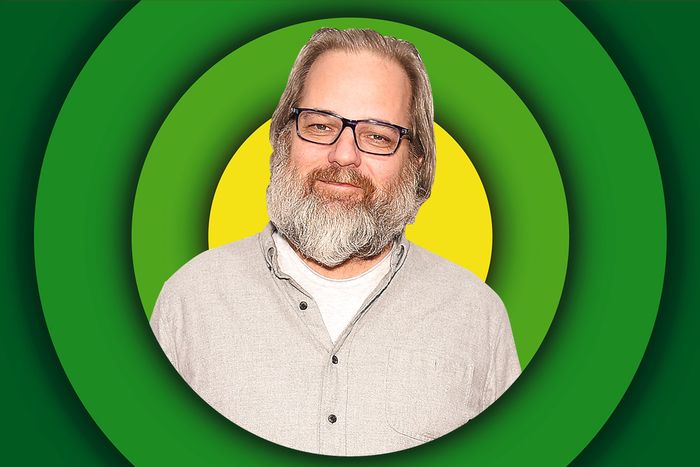
Dan Harmon would love to be able to talk about his work on its own terms. However, the ever-candid Harmon cannot easily separate the show Community from his experience working on it. Fan-favorite scenes bring up memories of network notes or fights with directors. Acclaim for the seasons (one, two, three, five, and six, of course) — which now are available on Netflix, Hulu, and Amazon — remind him of the harmful work environment he created. And today, the tremendous success of Rick and Morty undeniably comes with the baggage of the small but toxic portion of its fan base.
On Vulture’s Good One podcast, Harmon came on to discuss the Dean’s legendary “Payday Rap” from Community season five, but the conversation went on to cover being a boss, the fans of his works, and nihilism versus humanism. You can read an excerpt from the transcript or listen to the full episode below. Tune in to Good One every Thursday on Apple Podcasts, Spotify, Stitcher, Overcast, or wherever you get your podcasts.
Good One
Subscribe on:
During the first three seasons of Community, it felt like the press didn’t just ignore rumors and little asides that the show was really hard to work on, but they used it as proof of your greatness. Like, “He’s so dedicated to making this funny, he doesn’t care how long he’s making them work.” It was prime peak TV, auteur showrunner stuff.
Yes, the myth of the auteur.
You have been candid about your significant shortcomings running Community and trying to work on it. How has your thinking and feeling about being a boss evolved?
Older age and technology and exhaustion and being called out all intersected with I want to get home by five. And that should be a human right. A lot of cement mixers listening to this would be like, Oh, you’re home by five after thinking for a living, la-di-da. I won’t argue with that, but I will say, in therapy, what I have learned about people who study the brain of people who do creative work, it’s not like bricklaying, but if you sit for four hours and do nothing but not know what to do, it’s what we do to prisoners to punish them for being bad at prison. They take them out of where there’s certainty about things, and they put them into uncertainty in the form of solitary confinement. And we’re waking up to that being mental torture. To my cement-mixer brothers out there and my EMT workers and anybody listening to this, I’m not saying that what we do is difficult or even important. But what I will say is, yeah, if you do it for eight hours straight, you tend to get the same result. That four additional hours of people wanting to slit your throat in your sleep doesn’t help.
And the less sleep makes you hit the drawing board in the morning in a state of confusion. I would literally put myself in a daze back then. I was popping Adderall like Pez and sleeping on my office couch. My definition of when to stop was when the job was done, which is the definition of suicide if your job is creative. And you’re the one in charge of when it’s done. How do you know when a joke is finished? How do you know when a story is finished? I would just sit, and then if you were obedient enough, you would sit with me. And then your reward for that, which I’m unfortunately infamous for, is like, Maybe I love you. Maybe you’re here because you love me. And it’s like, No, you pay me to be here. I can’t leave or I’ll get fired. That is why I transgressed those boundaries — because I was in this fugue state. I would sleep for 20 minutes and then think about the show for three hours.
What Rick and Morty taught me after leaving Community was I would sit in the edit bay with Justin Roiland, and weeks before broadcast, we’d still be changing things in the edit bay in an episode that took a year and a half to make. Season three or four of Rick and Morty, I started to realize, My God, we’re changing this episode the same amount that we would change it had we spent longer writing it. A bomb went off in my head where I was like, How long did I make the animators wait for this script? And every time the line producer appeared in my doorway and said, “We really need to record voices tomorrow,” and like I was Orson Welles or something, I would say to them they’re the ones that needed to adopt my religion: You’re in the Matrix, man. Don’t you understand it does you no good to record a bunch of voices recording things I’m only going to rewrite? Why don’t you just wait until it’s finished, and then you could record something that would be ready for the people?
It took me so long to realize that’s not true! You are not an architect. You are not making blueprints. The difference between a writer in TV and an architect is that the architect is going to kill people if they don’t put the electrical outlets in the right place on their little map of how to build the building, and the concrete is going to harden, and then the changes can’t be made. A writer is creating a memo to hand off to his collaborators — his hundreds of collaborators who are being paid huge amounts of money and being asked to go away from their families to help you by saying, in animation, for instance, “Well, this is what stick figures would look like if they’re doing this thing that you wrote for 30 pages.” And you look at the stick figures and then you go, “Oh wow, those stick figures are wasting time for three minutes. I think maybe we should … ” You’re writing with others. You’re not a novelist. You’re not publishing a script that’s then being adapted by your underlings. You’re dancing with 300 people. And I think that would even apply to live-action.
You get asked about bad fans a lot, but I was curious if you feel misunderstood. And, as you continue to create the show, if you feel like you take that into account to make sure you are communicating what you are trying to communicate.
There is no getting around the fact that the thought process has to start to change after observing the public digesting material now. The really cynical way of looking at that is to say, Well, I made a character that’s really fun because he says, “Go fuck yourself.” And then I saw a meme that a Nazi used that says, “Go fuck yourself.” So my character is going to stop saying “Go fuck yourself” and start saying “Everybody hug each other.” That’s the map those Nazi kids draw. Where the accountability comes in is I want to disabuse people of this limited thinking. I don’t like that people receive instruction from television. I want them to get comfort from television, and I want to disabuse them of any part of them that thinks that television permits them to go through their day thinking certain thoughts — hence the lateral stuff in the meta stuff. Don’t let this carnival ride make you carnival-ride dependent. Get out there, make your own carnival ride, et cetera.
Nowadays, in a writers’ room conversation, when we’re breaking a story, it is unavoidable — knowing that some kid out there is like, “See, I knew it!” Now more than ever, when we’re breaking a story, I have to run everything through a simulator in my head, and I go, I don’t want this to be perceived as some kind of anti-trans message. Like, Oh, this is a story about octopus creatures that identify as unicorns and blah, blah, blah. And I’ll be like, Okay, can we be careful that we’re not doing a libertarian soapbox thing where our point is people are crazy when they believe things? I’ve never wanted a TV show to be that.
So, I do now check myself more than ever when we’re breaking stories. I’m like, “Can this not feel like a soapbox of any kind?” Even using like South Park, I would call that extreme compared to what I would like to accomplish. South Park will tell you, People go a little crazy sometimes when they think stuff, and it gets them all worked up, but really, if you’re just hanging out, making cartoons, you don’t really have to worry. That’s great, but I don’t even want that much soapbox. I don’t want to forget that if you’re watching, you might be in the most terrible mood of your life, living in a pit or a trench in a foreign country, like watching a crooked TV or some Max Headroom dystopia that I have no way of relating to, and I want you to just laugh at the human condition. I want you to be soothed and welcomed in, and I want your obsession to be rewarded. I do not want to send weird signals on top of that. As the world gets increasingly polarized and fucking vigilant about messaging, yes, I have increased my consciousness of like, Is it possible this will be perceived as messaging of any kind? And I don’t add water to make it not messaging, I’ll add confusion. Like, Well, anyone that thinks that will surely be thrown off when this happens.
I have tried in the past to service anxiety about that, and then I just hit a breaking point — I think probably around my QAnon canceling at the hands of the fucking comedy video I did. I was just like, You know what? Humans suck in groups. They’re terrible people, and the internet is awful at receiving comedy. But individual humans are fantastic at watching it, and they’re great at writing me messages and saying, “This helped me so much” and “I watch this with my dad.” Those people number in the millions. You just have to, at a certain point, be like, I cannot worry about the worst parts of this carnival. I have to die honest. Yes, everything I say nowadays is going to register on the Richter scale of people that are going to say “Classic blue pill cuck fucking sellout pussification dot hashtag or red pill blue pill” fucking nonsense.
I’m 48 — 15 year olds used to not be allowed to drink with us, and now we’re in this era where they’re right next to adults, and some of us are falling for it. We’re having arguments with teenagers. I’m not saying they’re bad people, but they’re teenagers, man. You used to be able to just say, “Get out of here. You can’t be here. This is for grownups. There’s boobs in here.” But now they’re just everywhere, and they can have an avatar of a guy in a beard. And they’re like [in a dumb voice], “I think critical race theory blah blah blah blah.” Dude, you’re 15. I was Republican too. All I learned was America is great. Get out of here, you kid. You can’t grow chin hair.
By the way, teenagers are great. Keep watching the show and also buy merchandise. There are T-shirts for teenagers and … skateboard wheels, I think? I want to buy a third house.
We last spoke at the Community reunion at Vulture Festival and, of course, I brought up the idea of a Community movie. And everyone was like, “Sure, I’d do it,” but I want to frame it a little differently. Assuming Donald [Glover] says yes, what are the conceptual or formal issues that would make it difficult to do? Why do you think it could be bad?
You’d have to ask yourself, “What tail’s wagging what dog?” Because if you’re doing a reunion movie, you’re doing it obviously to service fans of the show, so now you look at the X-Files movie and you say, “Did they do that right, or did they do that wrong?” And my conclusion was I don’t think they did it right or wrong. I would have hated to have to write that movie, because in an X-Files movie, you’d have to answer questions.
Here’s the biggest philosophical question: Are you supposed to service a mythical new viewer? The obvious, dogmatic, practical, off-the-street answer is like, No, you don’t. It’s fan service. Why would there be a Community movie? Who do you think is going to walk in off the street and buy popcorn and sit and watch a Community movie like that? They deserve to be punished. Why are they doing that?
Saying that that person doesn’t exist is a lot different from asking yourself structurally if you’re supposed to design the movie for them, because there’s a new viewer inside of all of us. If every Marvel movie started with inside references to all 90 other Marvel movies, even if you had seen all of them — even if on one level you’d be like, This is the greatest Marvel movie ever because all of the movies are in here — I think that a part of your brain would be going, Yeah, but it’s kind of not a good movie for this reason. It’s just speaking in gibberish. What does this mean? I exist in that camp like you? Formalistically, you owe a movie that I think the fans can not only enjoy, but they can stand back and go, You know, the crazy thing about this Community movie is that if you didn’t know there was a show, this is an insanely good movie. There’s a reason to watch it and then definitely watch the series because now you’re like, Holy crap. I don’t know if that’s arrogance, pretentiousness, responsibility, self-deprecation, torture. I can’t get myself out of that camp. Yes, there will be inside baseball. Yes, there will be fan service, but it has to be couched in …
It has to be a movie.
Yes. And then the other thing is — and maybe this folds into that — but per the Russo brothers, per Justin Lin, who directed the paintball episode and the Halloween episode, people will stop these guys on the street and demand a Community movie, in spite of their work on Fast and the Furious and at Marvel. What they always say to those guys is “So, if you did do a movie, it has to be paintball, right?” That kind of weighs on you, because I know that that sounds like a great idea, but do you really want to see a Community reunion movie that also has to do this committed irony to an entire genre of, like, we’re shooting paintballs and paintballs are like bullets? Don’t you remember that we did two sequels to paintball episodes, and beyond the initial hard-hitting, classic Emmy-worthy — not Emmy-getting — irony of doing a paintball episode of a sitcom, don’t you actually want there to be a level of groundedness to part of this too?
Do you want to see these people play dress-up in their old outfits and come in and go, “Look at me. Meeep meep, moop moop. Look what I used to do”? Yes, to some degree; no, to some degree. And contrary to that, do you want to see these people not doing that and coming in in pantsuits and going, “I’m an adult now. Meep meep, moop moop. Remember when we did this?” Is there a way to provide a little bit of all of it for everybody and come out on the other side, with everybody going, Wow, that is like everything I didn’t even know I wanted from a Community reunion”? If history is any teacher, what I will try to do is solve all those problems, and I’ll end up making a big plate of self-indulgent spaghetti that only five people love.
What are the next steps? Is it just like, once a day you meditate on it?
I have never done anything for free.
Like you need a deadline that is with a check.
Yeah. I started writing to keep my parents from hitting me, and I now only write to feel valid. But the upside of that is yes, I am, at least once a week, thinking about it, because the gears are turning. There is, like … a thing is happening. Logistically, the locks are coming away. And the only problems are becoming the creative ones, which is great, because I love those problems. I love having these conversations, and they’re being had. That’s a scoop you get, because I had a little Ketel One with my LaCroix.
More From This Series
- 91 Comedians Reveal Jokes They’d Like to Steal If They Could Get Away With It
- Paul F. Tompkins Is Getting Back Into It
- The Many Chicagos of South Side





